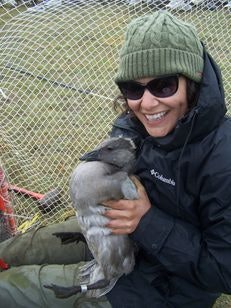A new study of ecologists and evolutionary biologists at U.S. colleges and universities reveals that female faculty and those who are caregivers, have been disproportionately affected by COVID-19.
 Dr. Lise Aubry
Dr. Lise AubryThe study, “Impacts of COVID‐19 on ecology and evolutionary biology faculty in the United States,” was published in the scientific journal Ecological Applications and highlights some interesting findings. It was conducted by three researchers: Dr. Lise Aubry, a Colorado State University (CSU) assistant professor in the department of fish, wildlife and conservation biology; Dr. Zhao Ma, a Purdue University professor of natural resource social science; and Dr. Theresa M. Laverty, a post-doctoral fellow in the CSU department of fish, wildlife and conservation biology.
Aubry came up with the idea for the study around the beginning of the pandemic, she said.
“At the time when the idea emerged, I basically just found out that our daycare had shut down,” she said. “And so, my husband and I find ourselves with our kids at home for pretty much six months – a four-month-old and a four-year-old. And so, we were trying to juggle our work and our kids.”
This got her thinking about how others – young assistant professors and those without partners to share duties with – were faring.
Aubry turned to Ma and Laverty, colleagues who were versed in survey design. Within three weeks, the three researchers had created the survey for ecology and evolutionary biology faculty.
“We wanted to stick to what we consider our academic family, because that’s the family we know,” Aubry said. “That was our survey population basically, because that’s the population that the three co-authors belong to.”
The survey population included assistant, associate and full professors as well as department heads and chairs, mostly tenure-track or already tenured, said Aubry, adding that 608 faculty answered the call.
One of the largest points of dissatisfaction that the survey found was that parents – particularly mothers – answered that they could not and did not have the time to get work done from home due to having to tend to their children.
Meanwhile, assistant professors wrote that the pandemic had led to missed opportunities.
 Dr. Zhao Ma
Dr. Zhao Ma“You’re trying to start your lab and get some research going and you also have to teach and mentor your students,” Aubry said. “Well, those young faculty find themselves spending a lot of time mentoring graduate students who are on their own during the pandemic and falling behind.”
Another finding concerned workplaces in the home. Laverty found herself disrupted when she worked in her living room or kitchen in lieu of a private work room, she said.
“Those who had access to a private space to work were a lot happier with how they were doing during the pandemic,” Aubry said. “But those who did not have access to a quiet space to get some work done were obviously significantly more dissatisfied with their work-life balance.”
Some of the parties the study was meant to reach were university administrators and faculty members participating in tenure or promotion reviews. This study revealed the struggles and impacts from the pandemic this year and in the long term.
 Dr. Theresa Laverty
Dr. Theresa Laverty“A year from now, when we’re out of this pandemic, people may not remember how terrible it has been for people and how it had affected all our day-to-day lives and work,” Ma said. “So we want to have something documented so, a year from now when somebody is being reviewed and their productivity in 2020 or 2021 is relatively low, there is some evidence that the faculty member or the reviewer or evaluator can go back to say, ‘This is what happened and you are not alone, we understand,’ and take that into consideration.”
The study also called for more faculty involvement in university decision-making.
“Communication between administrators and faculty exists, but decisions related to COVID-19 seem to result in unilateral, top-down policies,” the study wrote. “For example, some Universities are requiring freshman courses to be taught in person by faculty who may not feel safe doing so, yet have to, unless they can provide medical proof that they belong to a COVID-19 ‘at-risk’ category.”
Ma added that the response from administrators has been quite supportive.
“This is by no means to say they are not paying attention to the issue,” Ma said. “Both our big institutions, Colorado State and Purdue, are really going above and beyond to try to work with faculty members. But I think it is just really important to hear the voice of the faculty members directly.”





















